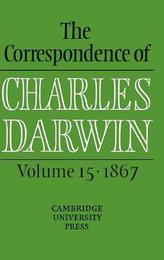
|
The Correspondence of Charles Darwin: Volume 15, 1867
Hardback
Main Details
| Title |
The Correspondence of Charles Darwin: Volume 15, 1867
|
| Authors and Contributors |
By (author) Charles Darwin
|
|
Edited by Frederick Burkhardt
|
|
Edited by James Secord
|
|
Edited by The Editors of the Darwin Correspondence Project
|
| Series | The Correspondence of Charles Darwin |
|---|
| Physical Properties |
| Format:Hardback | | Pages:750 | | Dimensions(mm): Height 240,Width 165 |
|
| ISBN/Barcode |
9780521859318
|
| Classifications | Dewey:576.82092 |
|---|
| Audience | | Professional & Vocational | | General | |
|---|
| Illustrations |
15 Halftones, unspecified
|
|
Publishing Details |
| Publisher |
Cambridge University Press
|
| Imprint |
Cambridge University Press
|
| Publication Date |
28 March 2006 |
| Publication Country |
United Kingdom
|
Description
During 1867 Darwin intensified lines of research that were to result in two important publications, Descent of Man and Selection in Relation to Sex and Expression of the Emotions in Man and Animals. Darwin circulated a questionnaire on human expression, asking his established contacts to pass it on to their acquaintances, with the result that he began to receive letters from an even more diverse and far-flung network of correspondents than had previously been the case. Convinced that human descent was strongly influenced by sexual selection, he also started to ask his correspondents about sexual differences in animals and birds. At the same time, he was working on the proof-sheets of another major work, Variation of Animals and Plants under Domestication, while negotiating almost weekly with French, German, and Russian translators. For information on the Charles Darwin Correspondence Project, see http://www.lib.cam.ac.uk/Departments/Darwin.
Reviews'The most recent volumes of Darwin's correspondence shed new light on the complex question of the origin's reception and Darwin's responses to his critics ... they allow us to see Darwin in his proper historical context ... The story ... is a more subtle complex and ultimately much more interesting one than those invented by the myth-makers ... The letters also tell us so much about Victorian attitudes and society, and serve as a useful reminder that neither Darwin's story nor that of the Origin finishes in 1859, demonstrating why the eventual publication of all Darwin's correspondence is going to be so useful.' Times Literary Supplement
|